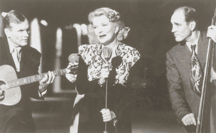Toole Time
Terence Davies brings high production values but little heart to film version of John Kennedy Toole's 'The Neon Bible'
By Richard von Busack
THE BOOK The Neon Bible deserves its reputation as juvenilia. The hero, David, is a sensitive boy of the poverty-stricken South of the 1930s. By the rigid standards of the time, his unmarried Aunt Mae is considered a fast woman. One night, she returns from an all-night date: "Mother and poppa never found out. ... I saw Aunt Mae pass by my bedroom when she came upstairs, and there were leaves all tangled in the back of her hair. I thought maybe she fell down." A more experienced author, such as John Kennedy Toole was to become, would have known enough to comb those leaves out. This particular nit is not alone for the picking; it has cousins throughout the slim book, but the author can't be blamed.
Toole committed suicide by carbon monoxide at age 31. He was a frustrated author with two unpublished novels, and (perhaps more ghastly than the gas) his hopes had been further dashed by having come very close to being published. In the early 1960s, Toole had rewritten A Confederacy of Dunces, sending it to New York from his native New Orleans for one revision after another. At the end of this literary game of cat and mouse, he was back where he started, the sole support of his mother and his father. After Toole's death, his mother rewarded his devotion by pestering various authors. Walker Percy read A Confederacy of Dunces and recommended it to the University of Louisiana Press. It became both a bestseller and one of the most beloved books of the last decade.
The Neon Bible, published after A Confederacy of Dunces, is a book of memories told by the sheltered adolescent David (Jacob Tierney) during a train journey. David lives with his warm theatrical aunt (Gena Rowlands) and his frail, battered and, eventually, mad mother (Diana Scarwid) in a remote Southern town during the 1930 and 1940s. In Terence Davies' film version, the citizens are all but deprived of the power of speech; the town is almost a wax museum, shown in long, silent takes broken by public singing. Davies' use of period music recalls that of Dennis Potter, who also contrasted popular music with unpopular lives. In The Singing Detective and Pennies From Heaven, Potter commented ironically on the delusions love songs sell. Davies, however, deploys music as epiphanies, moments of glory for the poorest of the poor. The Neon Bible, continuing the method Davies used in Distant Voices, Still Lives and The Long Day Closes, is full of beautiful, deeply focused compositions. Through this shadowy surface, the sudden flares of temper and of violence have a real-life incomprehensibilty.
The problem with The Neon Bible is that Davies is making the same film again and again, and all that's changing is the quality of the production values--he has hundreds of extras where he once had dozens. The mood, however, seems unnatural. You may have the same downtrodden Celtic stock on either side of the Atlantic, but there's a difference between the way Southerners and Liverpool Irish are priest-haunted, a difference in the response to the oppression that grinds them. Here, the handsome photography, the pregnant pause and the significant glance, though artistically imagined, are just meticulous banality. The Neon Bible is a story not as affecting as the tale of a writer who was considered to be worth nothing until he was dead.
[ Metro | Metroactive Central | Archives ]
This page was designed and created by the Boulevards team.

Bible Belters: Gena Rowlands sings a sanctified song in the film adaptation of John Kennedy Toole's "The Neon Bible."
The Neon Bible (Unrated; 92 min.), directed and written by Terence Davies, based on the book by John Kennedy Toole, photographed by Mick Coulter and starring Gena Rowlands, Diana Scarwid and Jacob Tierney.
From the July 3-10, 1996 issue of Metro
